Certainly, there was music and dance in Australia long before the white man's conquest.
The first (white) music allegedly performed on the Australian continent
was "The Rogue's March" in 1788. It was played when a sailor was dishonourably dismissed
after being caught in the tent of a female convict.
Australia was designed as the destination of the British empire's criminals
were transported to Van Diemen's Land (Tasmania) and Botany Bay (New South Wales).
Come all you gallant poachers that ramble void of care,
That walk out on a moonlit night with you dog, your gun and snare.
The hare and lofty pheasant you have at your command,
Not thinking of your last career upon Van Diemen's Land.
Poor Thomas Brown from Nenagh Town, Jack Murphy and poor Joe,
We was three determined poachers as the country well does know.
One night we were trepanned by the keeper's hideous hands,
And for fourteen years transported upon Van Diemen's Land.
The first day that we landed here upon the fatal shore,
The planters came around us, some twenty score or more;
They ranked us up like horses and they sold us out of hand,
And they yoked us up to plough, my boys, to plough Van Diemen's Land.
The houses that we live in are built of mud and clay
With rotten straw for bedding, we dared not to say nay.
Our cots were fenced with fire, and we slumber as we can,
To keep away the wolves and tigers upon Van Diemen's Land.
(Van Diemen's Land -> FW#24)
Britain and Ireland was depopulated of its swinish multitude,
usually for crimes as trivial as poaching or theft of food.
The first fleet in 1788, for example, carried 70 year old Elizabeth Beckford
transported for seven years of stealing 12 lb. Gloucester cheese, and 13 year
old Elizabeth Hayward stealing a linen gown and a silken cap worth 7 shilling.
The majority were ordinary criminals, with a good measure
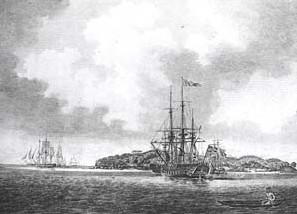 of peasants accused of agrarian outrage and some revolutionaries as well.
Irish statistics claim 400,000 deportees, consisting of about 320,000
common criminals, 80,000 social rebels, and 600 political rebels.
of peasants accused of agrarian outrage and some revolutionaries as well.
Irish statistics claim 400,000 deportees, consisting of about 320,000
common criminals, 80,000 social rebels, and 600 political rebels.
To end my lamentation, we're all in consternation
None dares for recreation until the day does dawn
For without hesitation, we are charged with combination
And sent for transportation from the hills of Mullaghbawn
(The Boys of Mullaghbawn -> FW#13)
The charge of combination referred to the membership of an illegal organisation,
either an agrarian secret society or an early trade union. There were the
Bonnymuir Weavers,
the Cato Street Conspirators,
Chartists,
Luddites,
the Tolpuddle Martyrs,
and Glasgow barrister Thomas Muir
celebrated in a Dick Gaughan song (-> FW#9").
More than 25 per cent of deportees were Irish.
United Irishmen
(-> FW#4,
FW#7,
FW#13),
Young Irelanders
and Fenians
were stubbornly dedicated to end British rule in Ireland by force of arms.
Irishmen led the 1804 Castle Hill rebellion which was the first
armed uprising by prisoners in Australia. The insurgents were defeated at a place
later re-named Vinegar Hill, referring to the Irish battle site of the 1798 rebellion.
United Irishmen leader Michael Dwyer
immigrated in 1806 and was interred at Waverley Cemetary, Sydney, where an elaborate monument was erected.
To his wife and children he bid adieu
From his loyal comrades he parted too
Saying, I'm forced to go to a foreign clime
Bound down in chains for a felon's crime
(Granua's Lament for the Loss of her Blackbird Mitchel)
Most of the 1848's Young Irelanders were sentenced to transportation for
treason-felony. Among them
John Mitchel
who made an escape to America where he took up the cause of
slavery. Later he returned to Ireland and was elected MP for Tipperary.
In the year '48 he was taken, you know
Next on board a ship he had for to go
Away from poor Granua in chains he was torn
An exile for life no more to return
Tho' sentence of transportation was passed
Thanks to Heaven his freedom has come at last
From Van Diemen's Land he showed them leg bail
On the back of a whale to New York he set sail
(The Escape of Meagher)
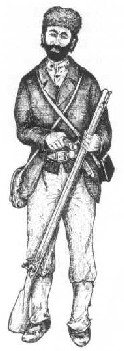 Thomas Francis Meagher
promised the judge before passing sentence:
My Lord, this is our first offence, but not our last. If you will be easy with us
this once, we promise on our word as gentleman to try better next time.
The infuriated judge sentenced them all to be hanged, drawn and quartered. However, protests forced Queen Victoria to commute the sentence to transportation for life.
Thomas Francis Meagher
promised the judge before passing sentence:
My Lord, this is our first offence, but not our last. If you will be easy with us
this once, we promise on our word as gentleman to try better next time.
The infuriated judge sentenced them all to be hanged, drawn and quartered. However, protests forced Queen Victoria to commute the sentence to transportation for life.
In 1874, word reached the Queen that one
Charles Gavan Duffy
had been elected Premier of the colony of Victoria.
It was the same Duffy who had been transported with Meagher 25 years ago.
It was revealed then that Meagher had become Brigadier General in the U.S. Army
and Governor of Montana. Richard O'Gorman became Governor General of Newfoundland,
Thomas D'Arcy McGee Minister of Agriculture in the Canadian Dominion, and Morris Lyene Attorney General of Australia, succeeded by another Young Irelander, Michael Ireland.
Let Kerry's sons remember well the men who marched alone
As they tramped the hills and mountains to bring Caitlin her throne
For he sleeps today where lonely waves wash over Australia's shore
And never again he'll see the glen of lovely sweet Foilmore
But Foilmore's sons remember well that gallant Fenian band
And forget not Johnny Golden out in Van Diemen's land
(Sigerson Clifford, The Ballad of Johnny Golden -> FW#28)
In the meantime Irishmen tried again. Yet "The Hougoumont" in 1867
was the last convict ship to be, carrying journalist
John Boyle O'Reilly
whose poem "Cry of the Dreamer" was set to music by Sean Tyrrell only recently (->
FW#28).
O'Reilly fled to America soon after and
became a champion for the rights of Jews, Indians and Blacks in his adopted country.
O'Reilly's friend John Devoy
became a rebel at the age of ten after a teacher smashed a slate over his head when
he refused to sing "God Save the Queen".
He spent several years in prison before emigrating to the United States.
Devoy and O'Reilly were the masterminds behind the dramatic rescue of six Fenians
from Western Australia on the whaling ship
"Catalpa"
in 1876 - and brought home Fenian prisoners from dying in foreign nations,
immortalised in a line in the "Galway Races" song.
A noble whale ship and commander was called the Catalpa, they say
Came out to Western Australia and took six poor Fenians away
So come all you screw warders and jailers, remember Perth Regatta Day
Take care of the rest of your Fenians, or the Yankees will steal them away
(The Catalpa)
Anyone heard singing the ballad in the 1870's would be sure of a night's free
lodging at the goverment's expense.
Transportation was abolished in 1868. Most convicts remained in Australia after their term was over
and became well-behaved citizens in the developing colony.
However, some continued a criminal career
(indeed, there were contemporary conjectures what effects a
continent turned upside down might have on moral conduct).
34 bushrangers were hanged in Sydney in 1822 alone.
One of the best known Australian ballads is "The Wild Colonial Boy",
though today more often sung in Ireland and America.
(It is said that a kid sang it to Ned Kelly on the night before his last stand.)
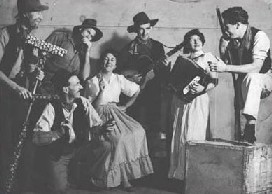
There was a wild Colonial boy, Jack Duggan was his name
Of poor but honest parents he was born in Castlemaine
He was his father's only hope, his mother's only joy
And dearly did they always love the Wild Colonial Boy.
He was scarcely sixteen years of age when he left his father's home
And through Australia's sunny clime the bushranger did roam
He robbed those wealthy squatters, their flocks he did destroy
And a terror to Australia was the Wild Colonial Boy.
(Wild Colonial Boy)
The hero of the song is a bushranger called Jack Donaghue - or Duggan or Doolan or
Dowling in other versions.
His birthplace is variously given as Castlemaine, Victoria, or Castlemaine,
Ireland. He is probably that
Jack Donohue
who was killed in a shoot-out with police near Sydney in 1830.
Donohue was born in Dublin and transported due to intent to commit
a felony. Soon after he took off to highway robbery.
He was nicknamed the stripper, because he made people take off their
clothes, or because he stripped them of everything they possessed.
The myth of "Bold Jack Donohue" lived on in a song of that name which was banned
in 1830 by Governor Darling, with anyone singing it risking a jail sentence for
inciting rebellion, and public houses on pain of loss of licence.
Come all you gallant bushrangers who gallop o'er the plains
Refuse to live in slavery, or wear the convict chains.
Come all you sons of liberty and everyone besides
I'll sing to you a story that will fill you with surprise
Concerning of a bold bushranger, Jack Donahue was his name
And he scorned to humble to the crown, bound down with iron chain.
As O'Donahoe was walking one summer's afternoon
Little was his notion that his death should be so soon
When a sergeant of the horse police discharged his carabine
And loudly called to O'Donahoe to fight or else resign
Nine rounds the horse policeman fired till at length a fatal ball
He lodged it in O'Donahoe's breast and it caused him for to fall
And as he closed his mournful eyes to this world he bid adieu
Good people all, both great and small, pray for Jack Donahoe
(Bold Jack Donohue)
The most famous - or infamous - of Australian bushrangers,
Edward Ned Kelly, was born in June 1854 at Beveridge in Victoria.
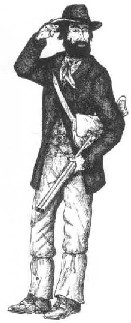 In 1841 his father John Red Kelly of Tipperary, Ireland,
had been sentenced to seven years transportation,
his crime either stealing two pigs or a calf or shooting at his landlord.
In 1841 his father John Red Kelly of Tipperary, Ireland,
had been sentenced to seven years transportation,
his crime either stealing two pigs or a calf or shooting at his landlord.
Kelly reputedly served time with fellow Tipperarian Francis MacNamara,
Frank the Poet,
at the convict settlement of Port Arthur in Damn Demon's Land.
MacNamara was the most significant voice of convict poetry,
the words of "Moreton Bay" are based upon his "Convict's Arrival".
(Ned Kelly used lines from the ballad in his 1879
Jerilderie Letter
in which he justified his doings.)
I am a native of Erin's Island and banished now from my native shore,
They tore me from my aged parents and from the maiden whom I do adore.
I've been a prisoner at Port Macquarie, at Norfolk Island and Emu Plains,
At Castle Hill and at cursed Toongabbie, at all those settlements I've worked in chains.
For three long years I've been beastly treated, and heavy irons on my legs I wore,
My back with flogging has been lacerated and often painted with my crimson gore.
Like the Egyptians and ancient Hebrews we were oppressed under Logan's yoke,
Till a native black lying there in ambush did deal this tyrant his mortal stroke.
My fellow prisoners be exhilarated that all such monsters such a death may find
And when from bondage we are liberated, our former sufferings will fade from mind.
(Frank MacNamara, The Convict's Arrival/Moreton Bay)
Commandant Patrick Logan of the Moreton Bay penal settlement was hated for his
brutal rule. He was killed by Aborigines in 1830 while exploring the Brisbane
river. When his body was brought back, the convicts manifested insane joy at
the news of his murder, and sang and hoorayed all night, in defiance of the warders.
In 1850 Red Kelly married the Irish immigrant Ellen Quinn,
and the family settled between Greta and Glenrowan when the old man died.
The best land then was held by a handful of wealthy landowners,
the squatters. The only opportunity for needy families was to own land as
selectors. Under the selection system introduced by Premier
Duffy in 1862,
families took up land and paid by installments with the promise
to clear the property, build a house and grow a crop.
Ned Kelly was born in a ramshackle hut, he battled since he was a kid,
He grew up with duffers and bad men and thieves and learned all the things that they did.
Ned Kelly would ride from the back-country hills, he'd ride into town like a lord,
He'd steal all the squatters' fine horses, and then he would take them back for the reward.
At sixteen young Ned was a wild, reckless lad, helped hold up a coach without fear,
But he was arrested, remanded, and then, they put him in gaol for a year.
When he came out, he was bitter and hard, far worse than he ever had been,
He robbed and he plundered, became a wild boy, the wildest Australia had seen.
(Ned Kelly Was Born In A Ramshackle Hut)
The squattocracy always tried to drive the selectors from the land.
To make a living, many families were forced to steal horses and cattle.
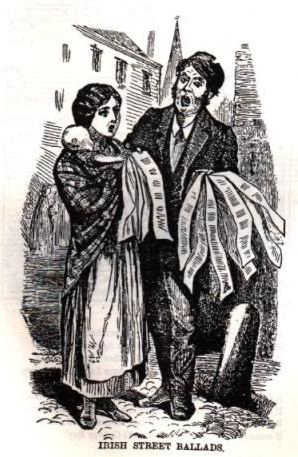 The Kellys too had frequent clashes with the law, Ned was first brought to court
at the age of 15. He was suspected cooperating with the bushranger Harry Power.
The Kellys too had frequent clashes with the law, Ned was first brought to court
at the age of 15. He was suspected cooperating with the bushranger Harry Power.
Henry Johnstone, alias
Harry Power,
was born in Waterford, Ireland, sentenced to seven years
transportation for stealing a pair of shoes.
In 1869 Power joined forces with Thomas and Jack Lloyd who were were Ned's uncles.
Power stole horses and bailed up mail coaches, and he was fond singing:
We might sing of young Gilbert, Dan Morgan, Ben Hall,
But the bold, reckless robber surpasses them all.
The pluck that's in Power is past all belief.
Daring highwayman! Professional thief!
In 1870 Power was sentenced to fifteen years which he served on the prison hulk "Success".
When he was released, the Government converted the "Success"
into a floating museum, with Old Harry being employed
as the main attraction.
Ned Kelly spent the 1870s stealing horses and serving a three year term.
In April 1878, Constable Alexander Fitzpatrick claimed that Ned shot him,
following an incident in which the police trooper assaulted his sister Kate.
Farewell my home in Greta, my loved ones fare thee well
It breaks my heart that we must part, but here I dare not dwell
They placed a price upon my head, my hands are stained with gore
And I must ride the country wild within the Australian shore
But if they cross or check my path, by all I hold on earth,
I'll give them cause to rue the day their mothers gave them birth
I'll shoot them down like kangaroos that roam our country wide
And leave their bodies bleaching upon some woodland side
(Farewell to Greta)
Ellen and other family members were arrested for aiding and abetting
attempted murder. Ned, his brother Dan and their mates Joe Byrne and
Steve Hart fled into the bush. In October four police troopers
set out to capture the Kelly Gang, but were surprised at Stringybark Creek.
Ned shot three troopers dead.
The ballad "Stringybark Creek" was attributed to Joe Byrne himself:
A Sergeant and three constables set out from Mansfield town
Near the end of last October for to hunt the Kellys down;
They started for the Wombat Hills and thought it quite a lark
When they camped upon the borders of a creek called Stringybark.
It was shortly after breakfast Mac thought he heard a noise
So gun in hand he sallied out to try and find the cause,
But he never saw the Kellys planted safe behind a log
So he sauntered back to smoke and yarn and wire into the prog.
But Ned Kelly and his comrades thought they'd like a nearer look,
For being short of grub they wished to interview the cook;
And of firearms and cartridges they found they had too few,
So they longed to grab the pistols and ammunition too.
Both the troopers at a stump alone they were well pleased to see
Watching as the billies boiled to make their pints of tea;
There they joked and chatted gaily never thinking of alarms
Till they heard the fearful cry behind, Bail up, throw up your arms!
The traps they started wildly and Mac then firmly stood
While Lonergan made tracks to try and gain the wood,
Reaching round for his revolver, but before he touched the stock
Ned Kelly pulled the trigger, fired, and dropped him like a rock.
Then after searching McIntyre all through the camp they went
And cleared the guns and cartridges and pistols from the tent,
But brave Kelly muttered sadly as he loaded up his gun,
Oh, what a bloody pity that the bastards tried to run.
(Stringybark Creek)
The authorities offered a large reward on their heads, dead or alive.
For two years Ned Kelly and his gang were on the run,
during this time robbing the banks of Euroa and Jerilderie.
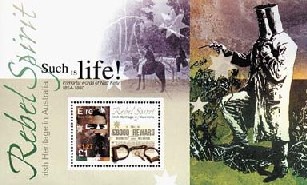
Come all you sons of liberty, the news is going round
That on the bold Ned Kelly's head they've set a thousand pound
And on Steve Hart, Joe Byrne and Dan, 2000 more they give,
But if the sum was doubled, I'm sure the Kelly boys would live
'Twas in November '78 when the Kelly gang came down,
Just after shooting Kennedy to claim Euroa town.
To rob the bank of all its gold was their idea that day,
Blood horses they were mounted on to make their getaway.
They rode into Jerilderie town at 12 o'clock at night,
Aroused the troopers from their beds & gave them an awful fright.
They held them up at pistol point and I'm ashamed to tell
They marched them along in their nightshirts and they locked them in a cell.
(The Kelly Gang)
Songs in praise of the Kelly Gang were sang all around the bush:
This is the more noticeable among the youth
in various large centres of population there, not
content with openly avowing their feelings in simple
conversation, they congregate occasionally at
street corners and elsewhere to sing ballads
- hymns of triumph as it were - in their praise.
But in June 1880 luck ran out. The police trapped the Kelly Gang
in the Glenrowan hotel. Joe Byrne was shot to death, Steve Hart and Dan Kelly
burned in the hotel. Ned Kelly, clad in armour and helmet,
was brought down by a volley of shots to the legs.
He was hanged on the 11th November 1880 at the Old Melbourne Gaol.
His last words were: Such is Life.
Down at Glenrowan they held up the pub, they were having a drink and a song,
The troopers rode up and surrounded the place, the Kellys had waited too long.
Ned came out shooting, a gun in each hand, and wearing his armour of steel,
He was fifteen times wounded before he fell down, never more would he plunder and steal.
They took him to Melbourne, and nursed him to health, the Judge said, You're guilty! to Ned,
A rope from a rafter, the sun in the east, and the famous Ned Kelly was dead.
Some say he's a hero who gave to the poor, while others A killer! they say,
It just goes to show the old saying is true, the saying that Crime does not pay.
Yet when I look round at some people I know, and the prices of things that I buy,
I say to myself, Well, perhaps after all, poor Ned wasn't such a bad guy.
(Ned Kelly Was Born In A Ramshackle Hut)
No happy ending for a blockbuster, but sufficient to gain entrance into folk memory,
regardless if Ned Kelly was a
bloodthirsty, brutal killer or Australia's answer to Robin Hood, waging
a war against injustice and inequality.
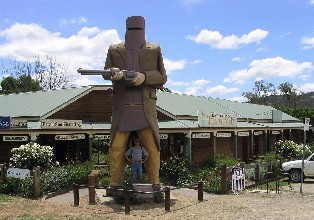 Ned's giant figure welcomes visitors at Glenrowan,
the phrase Game as Ned Kelly became part of the national idiom.
Numerous books, novels, even an opera, a musical and a ballet,
songs like Redgum's "Poor Ned" (from the 1970 Ned Kelly film and no vintage bush ballad as is often
believed, also recorded by Fairport Convention -> FW#24)
and Midnight Oil's "If Ned Kelly Were King"
have kept the story alive. Almost Kelly-mania:
Ned's giant figure welcomes visitors at Glenrowan,
the phrase Game as Ned Kelly became part of the national idiom.
Numerous books, novels, even an opera, a musical and a ballet,
songs like Redgum's "Poor Ned" (from the 1970 Ned Kelly film and no vintage bush ballad as is often
believed, also recorded by Fairport Convention -> FW#24)
and Midnight Oil's "If Ned Kelly Were King"
have kept the story alive. Almost Kelly-mania:
You should go down to Glenrowan,
They've got so much going and there's heaps for you to see,
You can start your day at the Ned Kelly museum,
It's a slice of history.
But best of all are the souvenirs you can take away with you:
They've got Ned Kelly boomerangs, Ned Kelly billy cans, Ned Kelly kangaroos,
Ned Kelly toothpicks, Ned Kelly horse whips and Ned Kelly helmets too.
Ned Kelly condoms, Ned Kelly bonbons, Ned Kelly jams and sauce,
Ned Kelly pencils, Ned Kelly stencils and Ned Kellies on a horse.
Ned Kelly teaspoons, Ned Kelly perfumes, Ned Kelly bars of soap,
Ned Kelly beer mats, Ned Kelly bush hats, and Ned Kellies on a rope.
Ned Kelly pistols, Ned Kelly crystals, New age Ned Kellies and more,
With Ned Kelly key rings and Ned Kelly g-strings made in Singapore.
(Hicks/Francis, Ned Kelly Souvenir Song)
The 19th century ended with an economic crisis and bitter conflicts
between employers and trade unions. Here even lies the origin of
Australia's inofficial national anthem
"Waltzing Matilda".
The song's character is the Bavarian Samuel Frenchy Hoffmeister who led a gang of
striking shearers and was wanted by the police of Queensland, the
title probably going back to the German words auf der Walz (on the road).
Let C. Turnbull have the final say: The 'jolly' swagman who had the jumbuck
in his tucker-bag is sung of by respectable gentlemen in Rotary Clubs
without apparent realisation that this song is a reflection of an
unending conflict between the disinherited and the possessors, for,
wherever the sympathy goes in the song, it is certainly not to the
'troopers, one, two, three.'
Links:
www.nedkellysworld.com.au,
www.ironoutlaw.com,
www.crixa.com
Australian Artists featured at FolkWorld /
Australian Book Reviews
Back to the content of FolkWorld Features
To the content of FolkWorld No. 31
© The Mollis - Editors
of FolkWorld; Published 11/2005
All material published in FolkWorld is © The
Author via FolkWorld. Storage for private use is allowed and welcome. Reviews
and extracts of up to 200 words may be freely quoted and reproduced, if source
and author are acknowledged. For any other reproduction please ask the Editors
for permission. Although any external links from FolkWorld are chosen with greatest
care, FolkWorld and its editors do not take any responsibility for the content
of the linked external websites.
FolkWorld - Home of European Music

Layout & Idea of FolkWorld © The
Mollis - Editors of FolkWorld
 2005 marks the 125 year anniversary of Ned Kelly's last stand. Australia's famous
bushranger was the hero of a 1970 movie picture starring rock singer Mick Jagger,
which included the traditional ballads "The Wild Colonial Boy" and "She Moved Through the
Fair" (the latter tune often employed when an Irish tune is needed, though, ironically,
the words had been written by Padraic Colum 30 years after Ned Kelly's death).
Generally, Tony Richard's rather weak production had a country music soundtrack,
courtesy of Shel Silverstein with vocals from Waylon Jennings and Kris Kristofferson.
In Gregor Jordan's 2002 film version of the Ned Kelly story,
German composer Klaus Badelt wrote an emotional Titanic-like score
featuring some haunting slow airs played on pipes and low whistle.
Furthermore, there's some jigs & reels in the pub scenes
performed by the Idle Diddlies band and Bernard Fanning's rendition of "Moreton Bay".
The words of that poem had been written by Frank MacNamara (*1811) and were later
put to a variant of the tune "Boolavogue".
2005 marks the 125 year anniversary of Ned Kelly's last stand. Australia's famous
bushranger was the hero of a 1970 movie picture starring rock singer Mick Jagger,
which included the traditional ballads "The Wild Colonial Boy" and "She Moved Through the
Fair" (the latter tune often employed when an Irish tune is needed, though, ironically,
the words had been written by Padraic Colum 30 years after Ned Kelly's death).
Generally, Tony Richard's rather weak production had a country music soundtrack,
courtesy of Shel Silverstein with vocals from Waylon Jennings and Kris Kristofferson.
In Gregor Jordan's 2002 film version of the Ned Kelly story,
German composer Klaus Badelt wrote an emotional Titanic-like score
featuring some haunting slow airs played on pipes and low whistle.
Furthermore, there's some jigs & reels in the pub scenes
performed by the Idle Diddlies band and Bernard Fanning's rendition of "Moreton Bay".
The words of that poem had been written by Frank MacNamara (*1811) and were later
put to a variant of the tune "Boolavogue".  of peasants accused of agrarian outrage and some revolutionaries as well.
Irish statistics claim 400,000 deportees, consisting of about 320,000
common criminals, 80,000 social rebels, and 600 political rebels.
of peasants accused of agrarian outrage and some revolutionaries as well.
Irish statistics claim 400,000 deportees, consisting of about 320,000
common criminals, 80,000 social rebels, and 600 political rebels.


 In 1841 his father John Red Kelly of Tipperary, Ireland,
had been sentenced to seven years transportation,
his crime either stealing two pigs or a calf or shooting at his landlord.
In 1841 his father John Red Kelly of Tipperary, Ireland,
had been sentenced to seven years transportation,
his crime either stealing two pigs or a calf or shooting at his landlord.
 The Kellys too had frequent clashes with the law, Ned was first brought to court
at the age of 15. He was suspected cooperating with the bushranger Harry Power.
The Kellys too had frequent clashes with the law, Ned was first brought to court
at the age of 15. He was suspected cooperating with the bushranger Harry Power.

 Ned's giant figure welcomes visitors at Glenrowan,
the phrase Game as Ned Kelly became part of the national idiom.
Ned's giant figure welcomes visitors at Glenrowan,
the phrase Game as Ned Kelly became part of the national idiom.
